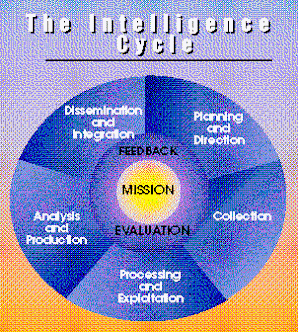Intelligence Sources: The Importance of Open Source Information
Open source information means data obtained from public sources.It is extracted from newspapers, journals, radio and television, and the Internet. Intelligence analysts have long used such information to supplement classified data, but systematically collecting open source information has not traditionally been a priority. However, in recent years, given changes in the international environment, there have been calls, from Congress and the 9/11 Commission for instance, asking for a more intense and focused investment in open source collection and analysis. Many, however still emphasize that the primary business of intelligence continues to be obtaining and analyzing secrets. A consensus now exists that OSINT must be systematically collected and should constitute an essential component of analytical products.
For 40 years, U.S. presidents have begun each day with a top-secret, personal briefing on security threats and global affairs obtained largely from covert spy missions, clandestine satellite surveillance and other highly classified intelligence sources. Now, however, the President's Daily Brief and other crucial intelligence reports often rely less on secrets from risky espionage missions than on material that's available to just about anyone. Intelligence officers have gleaned insights on Iran's nuclear capabilities from photos on the Internet. They've scooped up documents, including a terrorist training manual, at international conferences and public forums. They've found information in foreign university libraries and newscasts.
While open source intelligence may come from unclassified material that's available to anyone with a television or an internet connection. Michael Hayden, CIA chief under President George W. Bush, believes even finished products created from OSINT must be kept out of public view as it's just too sensitive for average people to see. The information may be unclassified, but official interest in it is not!
In the information Age, that enjoys a proliferation of publicly available information, it seems ironic that in many places it still is considered a poor cousin. Even more so when you consider that some analysts in law enforcement and the intelligence community undervalue open source information precisely because it is so readily available.
Nobody tasked with intelligence in the field of public safety should ignore open sources. Open source material not only fills in blanks about often-elusive adversaries; it can also give a broader sense of the mood in a particular country, or the feeling in a particular group. Open Source information should be appropriately and regularly collected to meet agency needs and lead and direct all police operations.
In our new era, everyone, including terrorists, may use open sources of information that are equal or superior to secret sources. The new craft of intelligence requires all the players to function as part of a team, and asks them to win however they can. It uses the collective wisdom of all the participants. It encourages the crowd to participate. Open source intelligence harnesses what everyone sees and knows. It changes the rules of the game.
Links for further information on Open Source Information/Intelligence:
- Richard A. Best, Jr. & Alfred Cumming. Open Source Intelligence (OSINT): Issues for Congress. Congressional Research Service.
- David F. Noble. Fusion of Open Source Information. Evidence Based Research, Inc.
- David F. Noble. Structuring Open Source Information to Support Intelligence Analysis. Evidence Based Research, Inc.
- CSS Analyses in Security Policy. Open Source Intelligence: A Strategic Enabler of National Security. Center for Security Studies.
- Arnaud de Borchgrave, Thomas Sanderson, & John MacGaffin. Open Source Information: The Missing Dimension of Intelligence. Center for Strategic and International Studies.


0 comments:
Post a Comment